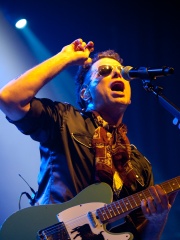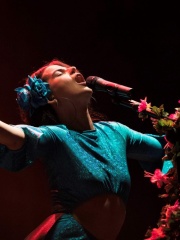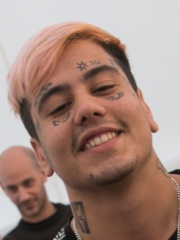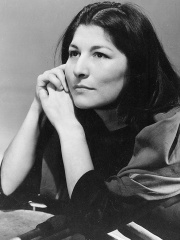
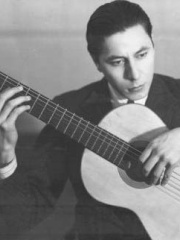
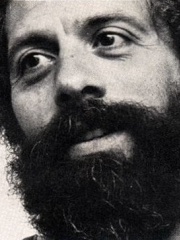
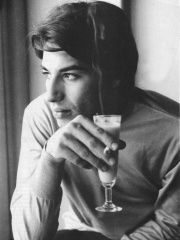
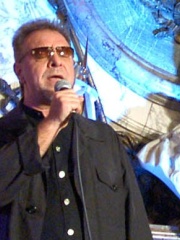

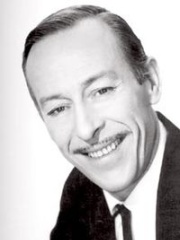
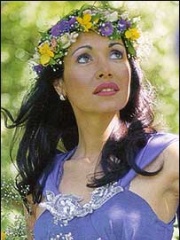
The Most Famous
SINGERS from Argentina
Top 10
The following people are considered by Pantheon to be the top 10 most legendary Argentinean Singers of all time. This list of famous Argentinean Singers is sorted by HPI (Historical Popularity Index), a metric that aggregates information on a biography's online popularity. Visit the rankings page to view the entire list of Argentinean Singers.

1. Mercedes Sosa (1935 - 2009)
With an HPI of 70.68, Mercedes Sosa is the most famous Argentinean Singer. Her biography has been translated into 50 different languages on wikipedia.
Haydée Mercedes Sosa (9 July 1935 – 4 October 2009) was an Argentine singer who was popular throughout Latin America and many countries outside the region. With her roots in Argentine folk music, Sosa became one of the preeminent exponents of El nuevo cancionero. She gave voice to songs written by many Latin American songwriters. Her music made people hail her as the "voice of the voiceless ones". She was often called "the conscience of Latin America". Sosa performed in venues such as the Lincoln Center in New York City, the Théâtre Mogador in Paris, the Sistine Chapel in Vatican City, as well as sold-out shows in New York's Carnegie Hall and the Roman Colosseum during her final decade of life. Her career spanned four decades and she was the recipient of six Latin Grammy awards (2000, 2003, 2004, 2006, 2009, 2011), including a Latin Grammy Lifetime Achievement Award in 2004 and two posthumous Latin Grammy Award for Best Folk Album in 2009 and 2011. She won the Premio Gardel in 2000, the main musical award in Argentina. She served as an ambassador for UNICEF.

2. Atahualpa Yupanqui (1908 - 1992)
With an HPI of 63.77, Atahualpa Yupanqui is the 2nd most famous Argentinean Singer. His biography has been translated into 31 different languages.
Atahualpa Yupanqui (Spanish pronunciation: [ataˈwalpa ʝuˈpaŋki]; born Héctor Roberto Chavero Aramburu; 31 January 1908 – 23 May 1992) was an Argentine singer, songwriter, guitarist, and writer. He is considered one of the most important Argentine folk musicians of the 20th century.

3. Facundo Cabral (1937 - 2011)
With an HPI of 63.05, Facundo Cabral is the 3rd most famous Argentinean Singer. His biography has been translated into 35 different languages.
Facundo Cabral (born Rodolfo Enrique Cabral Camiñas; May 22, 1937 – July 9, 2011) was an Argentine singer-songwriter. He was best known as the composer of "No soy de aquí ni soy de allá" ("I'm not from here nor from there"), "Pobrecito mi Patron" ("My Poor Boss"), and many other compositions. His songs have been covered by multiple Spanish language performers such as Jorge Cafrune, Alberto Cortez, Juan Luis Guerra, and Joan Manuel Serrat. Cabral protested military dictatorships in Latin America through activism and art from the 1970s onward, and his music combined mysticism and spirituality with calls for social justice and equality. After touring the world, Cabral enjoyed popularity in his home country during the early 1980s, when Argentine radio demanded local content after the Falklands War. He was popular throughout Latin America in his lifetime and still enjoys a sizeable posthumous legacy throughout the continent. For his advocacy for peace through his work, Facundo Cabral was named a UNESCO Messenger of Peace in 1996.

4. Sandro de América (1945 - 2010)
With an HPI of 59.08, Sandro de América is the 4th most famous Argentinean Singer. Her biography has been translated into 28 different languages.
Roberto Sánchez-Ocampo (August 19, 1945 – January 4, 2010), better known by his stage names Sandro or Sandro de América, was an Argentine singer and actor. He is considered a pioneer of Argentine rock for being one of the first rock artists to sing in Spanish in Latin America. He edited 52 official records and sold eight million copies although other sources state that he sold over 10 million. Some of his most successful songs are "Dame fuego", "Rosa, Rosa", "Quiero llenarme de ti", "Penumbras", "Porque yo te amo", "Así", "Mi amigo el Puma", "Tengo", "Trigal", and "Una muchacha y una guitarra". The single "Rosa, Rosa" sold two million copies, being his most recognizable and famous song. Another of his hits, "Tengo" was given 15th place among the 100 best Argentine rock songs by both MTV and Rolling Stone magazine. In Latin America he was often compared to Elvis Presley at the height of his popularity. Sandro was also the first Latin American artist to sing at the Felt Forum at Madison Square Garden. In 2005, Sandro received the Latin Grammy Lifetime Achievement Award.
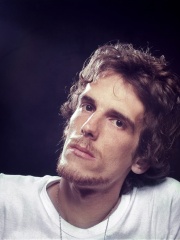
5. Luis Alberto Spinetta (1950 - 2012)
With an HPI of 58.07, Luis Alberto Spinetta is the 5th most famous Argentinean Singer. His biography has been translated into 22 different languages.
Luis Alberto Spinetta (23 January 1950 – 8 February 2012), nicknamed "El Flaco" (Spanish for "skinny"), was an Argentine singer, guitarist, composer, writer and poet. One of the most influential rock musicians of Argentina, he is widely regarded as one of the founders of Argentine rock, which is considered one of the first incarnations of Spanish-language rock. Born in Buenos Aires, he was the founder of several iconic rock bands including Almendra, Pescado Rabioso, Invisible, Spinetta Jade, and Spinetta y Los Socios del Desierto. In Argentina, January 23rd is celebrated as "Día Nacional del Músico" (National Musician's Day) in honor of Spinetta's birth. Spinetta devoted himself fully to his own music. In his lyrics, there are influences of multiple writers, poets and artists like Arthur Rimbaud, Vincent van Gogh, Carl Jung, Sigmund Freud, Friedrich Nietzsche, Michel Foucault, Gilles Deleuze, Carlos Castañeda and Antonin Artaud, whom the album Artaud (1973) is named after. In December 2011 he announced that he had been diagnosed with lung cancer. He died on 8 February 2012 at the age of 62. His ashes were scattered in Buenos Aires in the waters of the Río de la Plata, according to his last wish.

6. León Gieco (b. 1951)
With an HPI of 54.58, León Gieco is the 6th most famous Argentinean Singer. His biography has been translated into 20 different languages.
Raúl Alberto Antonio Gieco (born November 20, 1951), better known as León Gieco, is an Argentine folk rock singer, songwriter, musician and interpreter. He is known for mixing popular folkloric genres with Argentine rock, and lyrics with social and political connotations, leading to him being called "The Argentine Bob Dylan".

7. Ricardo Montaner (b. 1957)
With an HPI of 54.45, Ricardo Montaner is the 7th most famous Argentinean Singer. His biography has been translated into 17 different languages.
Héctor Eduardo Reglero Montaner (born 8 September 1957), better known as Ricardo Montaner (Spanish pronunciation: [riˈkaɾðo montaˈneɾ]), is an Argentine-born singer. Since starting his career in the late 1970s, he has released more than 24 albums, and many successful singles. He has sold an estimated 10 million records worldwide, making him one of the best-selling Latin music artists.

8. Roberto Goyeneche (1926 - 1994)
With an HPI of 54.35, Roberto Goyeneche is the 8th most famous Argentinean Singer. His biography has been translated into 17 different languages.
Roberto Goyeneche (January 29, 1926 in Saavedra, Autonomous City of Buenos Aires – August 27, 1994 in Buenos Aires) was an Argentine tango singer who epitomized the archetype of 1950s Buenos Aires' bohemian life, and became a living legend in the local music scene. Despite being of Basque descent, he was known as El Polaco ("the Pole") due to his light hair and thinness, like young Polish people of the time. He is identified with the neighborhood of Saavedra, where he grew up.

9. Gilda (1961 - 1996)
With an HPI of 53.76, Gilda is the 9th most famous Argentinean Singer. Her biography has been translated into 29 different languages.
Myriam Alejandra Bianchi (11 October 1961 – 7 September 1996), known by her stage name Gilda, was an Argentine cumbia singer and songwriter.
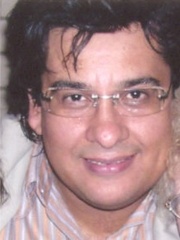
10. Marcelo Álvarez (b. 1962)
With an HPI of 52.69, Marcelo Álvarez is the 10th most famous Argentinean Singer. His biography has been translated into 16 different languages.
Marcelo Raúl Álvarez (born February 27, 1962) is an Argentine lyric tenor who achieved international success starting in the mid-1990s. Álvarez travels widely, performing with top singers in major opera houses and concert halls around the world. Since the beginning of his career in 1994, he has maintained an active touring schedule and debuted in 34 roles. In addition to his opera and solo recordings, he has made an album honoring the popular songs of Argentine tango legend Carlos Gardel, as well as an album of classical duets with Salvatore Licitra. He has won notable awards for vocal performance and is considered one of the top tenors of his generation, receiving high acclaim for his passionate yet refined delivery in bel canto roles, French opera, and as of 2006, more dramatic lirico pieno (full lyric) and spinto roles. He lives with his wife and son near Milan, Italy.
People
Pantheon has 23 people classified as Argentinean singers born between 1908 and 2000. Of these 23, 16 (69.57%) of them are still alive today. The most famous living Argentinean singers include León Gieco, Ricardo Montaner, and Marcelo Álvarez. The most famous deceased Argentinean singers include Mercedes Sosa, Atahualpa Yupanqui, and Facundo Cabral. As of April 2024, 3 new Argentinean singers have been added to Pantheon including Wanda Nara, Nicki Nicole, and María Becerra.
Living Argentinean Singers
Go to all RankingsLeón Gieco
1951 - Present
HPI: 54.58
Ricardo Montaner
1957 - Present
HPI: 54.45
Marcelo Álvarez
1962 - Present
HPI: 52.69
Andrés Calamaro
1961 - Present
HPI: 52.62
Wanda Nara
1986 - Present
HPI: 51.74
Chenoa
1975 - Present
HPI: 46.92
Nicki Nicole
2000 - Present
HPI: 46.53
Lola Ponce
1977 - Present
HPI: 45.51
Diego Torres
1971 - Present
HPI: 44.98
Pablo Ruiz
1975 - Present
HPI: 43.88
Nathy Peluso
1995 - Present
HPI: 42.35
Duki
1996 - Present
HPI: 41.83
Deceased Argentinean Singers
Go to all RankingsMercedes Sosa
1935 - 2009
HPI: 70.68
Atahualpa Yupanqui
1908 - 1992
HPI: 63.77
Facundo Cabral
1937 - 2011
HPI: 63.05
Sandro de América
1945 - 2010
HPI: 59.08
Luis Alberto Spinetta
1950 - 2012
HPI: 58.07
Roberto Goyeneche
1926 - 1994
HPI: 54.35
Gilda
1961 - 1996
HPI: 53.76
Newly Added Argentinean Singers (2025)
Go to all RankingsWanda Nara
1986 - Present
HPI: 51.74
Nicki Nicole
2000 - Present
HPI: 46.53
María Becerra
2000 - Present
HPI: 37.49
Overlapping Lives
Which Singers were alive at the same time? This visualization shows the lifespans of the 7 most globally memorable Singers since 1700.

